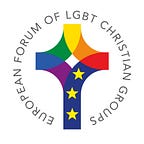Why the European Forum for LGBT Christian Groups is still needed, 40 years on: a reflection
Paul Whiting currently serves on the global Governing Board of Metropolitan Community Churches and is on the MCCNL delegation to the Forum.
I first attended the Forum in 1984. It was the first time my group, the Lesbian & Gay Christian Movement had participated and intentionally sent a male and female delegate, having recently gone through a name change to reflect the gender parity that we had just adopted. That was quite radical in the 80s.
Europe was very different back then. We were waking up to the fact that we were in the middle of the AIDS crisis that was devastating many of our groups whose depleted budgets were being diverted from campaigning to AIDS care and education. Never was there a more timely moment for gender parity as women stepped up in support and leadership. Never was it more timely for a Forum to connect so many organizations that existed in isolation.
Meanwhile we saw a backlash of conservative governments and right wing Christian groups. Conversion therapists reappeared in force. Many of our groups had to protect the identities of the members, some who held high profile positions in religious life. In the main, we were liberal Catholics and Protestants from Northern Europe. It was difficult to find any substantive groups in Spain or Italy, and almost no contacts east of Germany. The primary Evangelical representation was from Centre du Christ Liberateur in Paris, and Metropolitan Community Church, who were not granted full membership because they were constituted as a church and not an organization.
We were predominately white male, though very diverse in age. I was 28 and among a new generation of “out” activists who had not known the confines of criminal identity that many of our older brothers grew up with.
In the midst of all this we were a visionary group putting in place a proposal for a permanent organization, bylaws under Dutch law and a goal for gender parity. There was a pastoral concern for countries not represented and a passion to reach into Eastern Europe. Excitement erupted in 1988 when a delegation from East Germany arrived at the London conference.
This year, 2021, we held a virtual conference as our 40th gathering. It was a joy to be part of; a masterpiece of digital conferencing; a coming home even though we were not physically together. After an absence of 25 years (I emigrated to North America) I reconnected in person in 2017 in Gdansk to rediscover many familiar faces as well as seeing significant transition. Strengths had shifted. Groups in the “old” North were fading or had completely disappeared, being replaced by multiple groups in Southern and Eastern Europe.
Some things had not changed. While there were always liberal theologians willing to ally with us and address our gatherings, it was a constant struggle to engage with official Church representatives. Meetings always had to be on their terms and agenda, and so often fell through. Noticeably, the composition has shifted between groups campaigning within churches and groups providing pastoral support outside of them. Stepping outside of the religious restrictions gave us the opportunity to partner in political arenas, which in itself is transformational and more fluid as political allegiances shift more easily than religious ones.
However, we are white and noticeably older, probably a reflection of the groups we represent. While we are stronger in the “LBTQ” identity we are still a minority voice; in many places still an oppressed voice. We remain committed to a task of shifting opinion in an institution that shifts very slowly offering many false hopes.
2021 will be the year that the church changed; at least the many expressions of it. Digital church will now be a serious component and likely engage more LGBTQ people than traditional concepts. However, while we tell ourselves the old norms will not return, they do; often within a couple of generations because we so easily forget or become isolated once more in our own bubble. The extremes of the Church will always seek to obliterate our courage and authenticity as they live falsely into their own. We must challenge that. It’s tough to be queer Christian. We must keep our own authentic faith alive amid the constraints of secularism and capitalism that would strip the gospel of Jesus of its values. We can only speak for ourselves, so while we are white, educated and probably middle class, that’s who we will speak for. We need to engage others who can speak for the absent voices for we, at best, can only advocate for them. We need to be the sharers of good news, queer scripture, and fabulous testimony.
Here’s to at least twenty more years.
